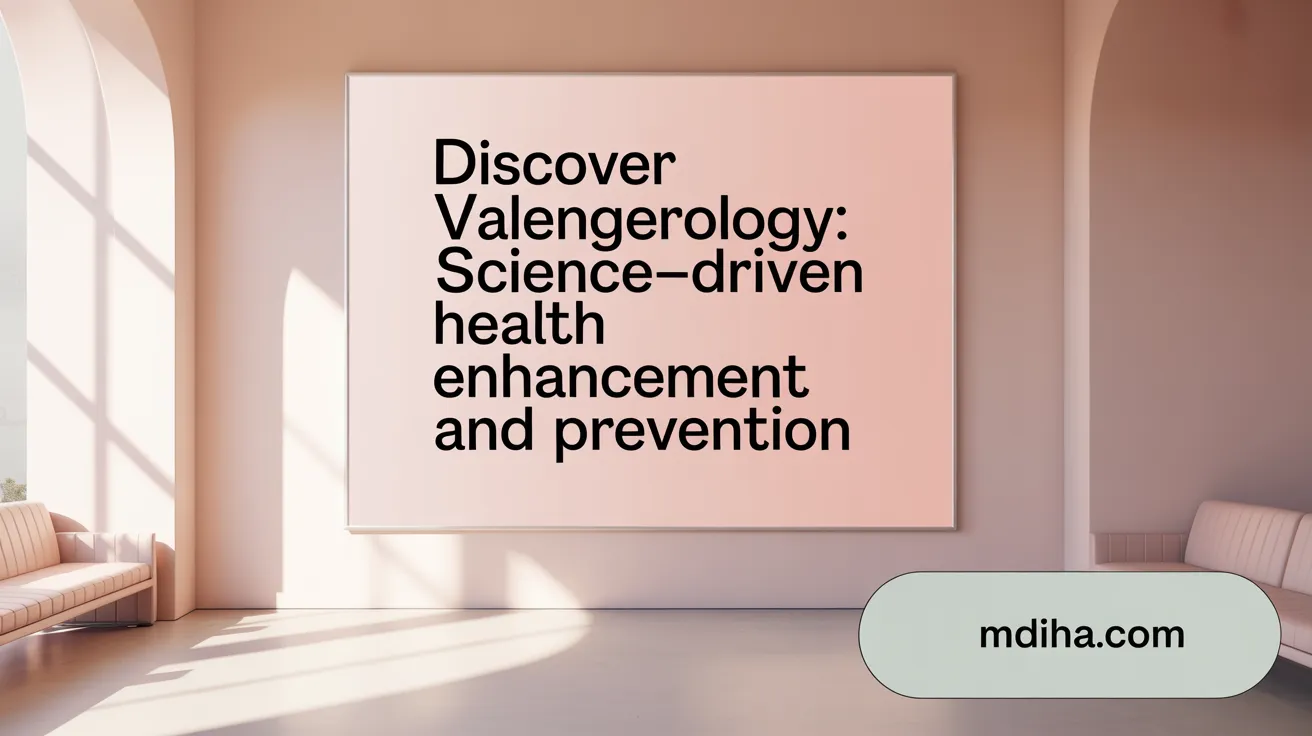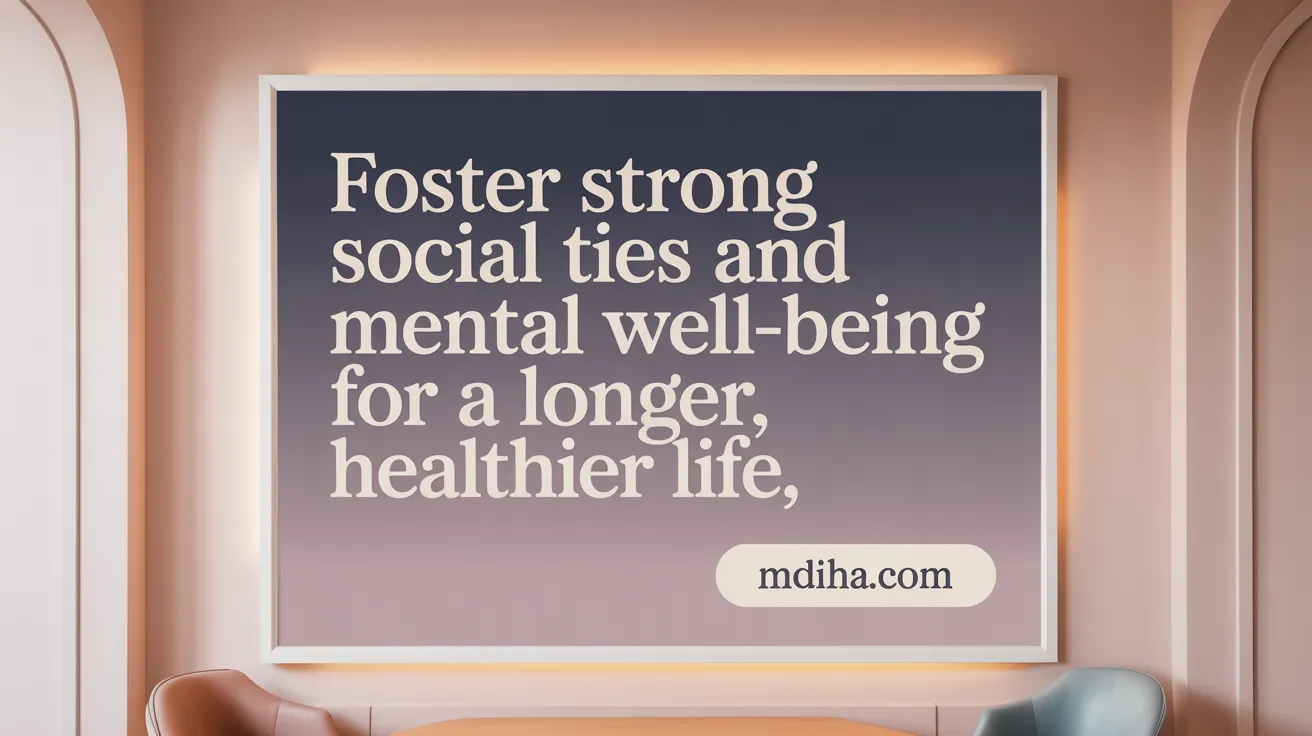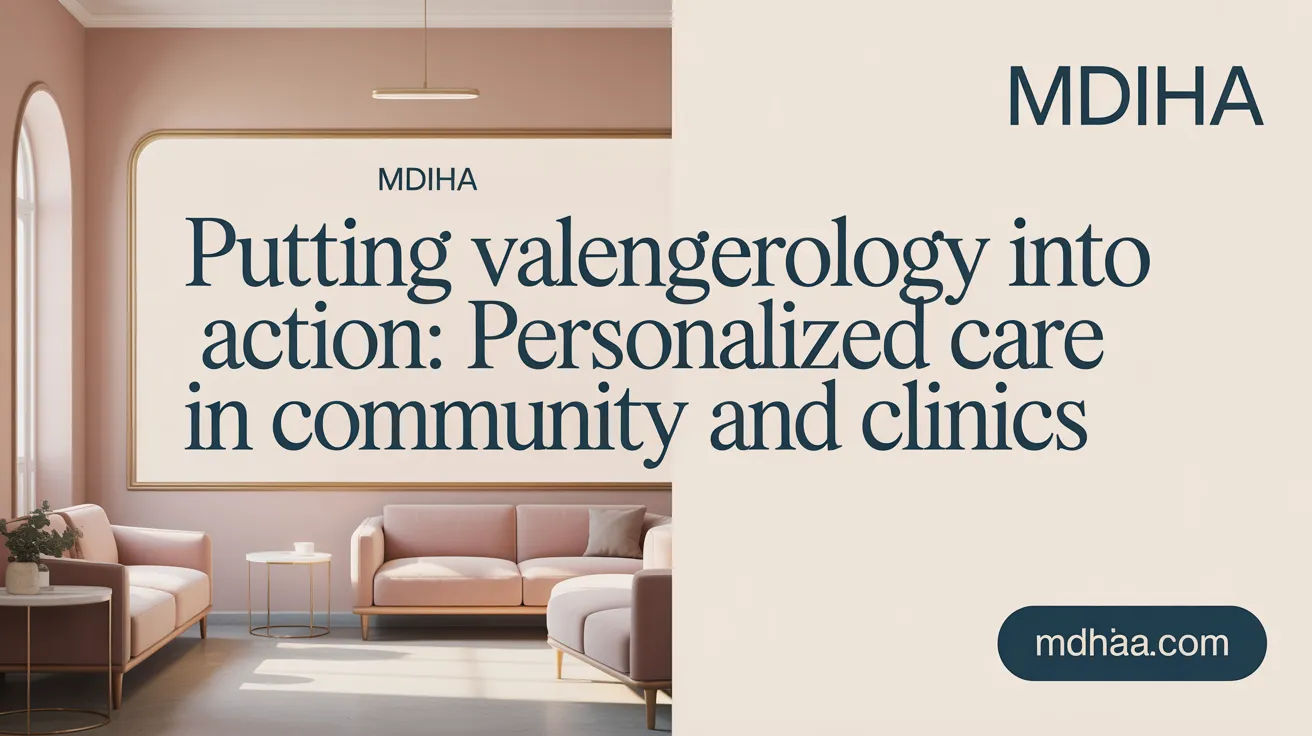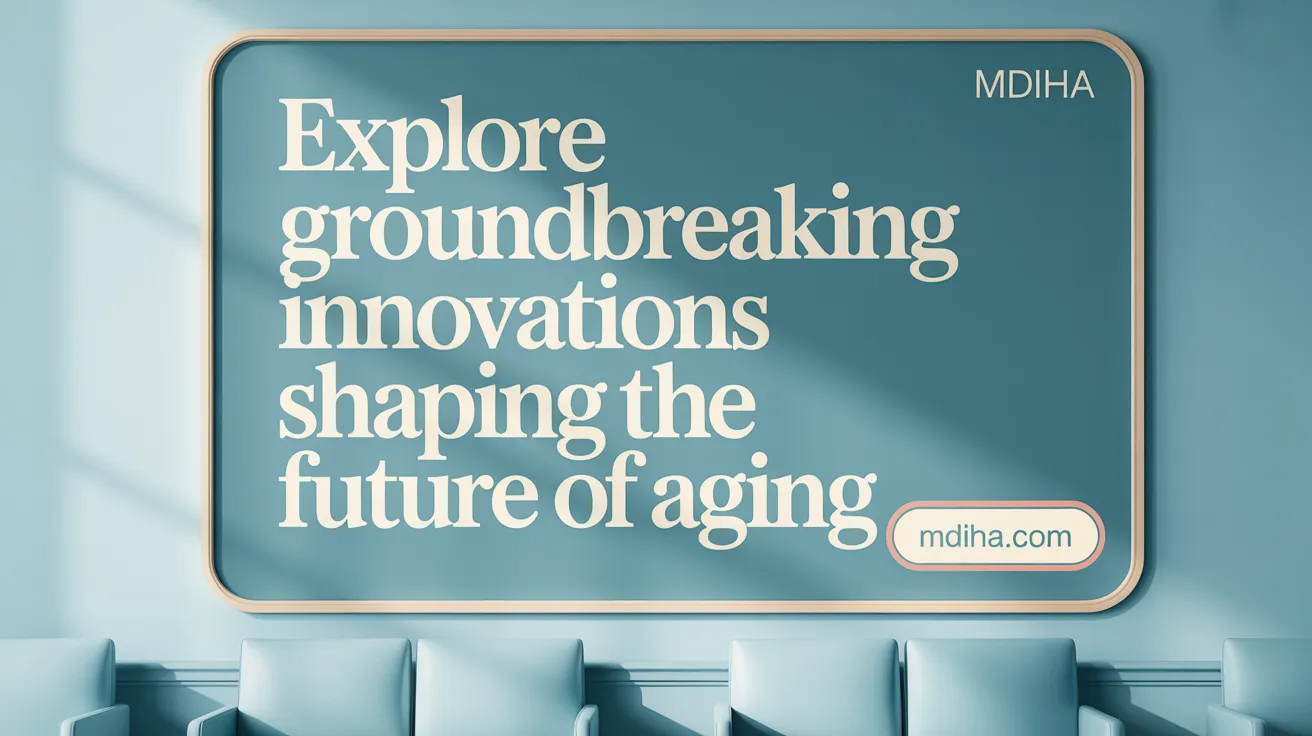Introduction to Aging Well and Valengerology
Understanding Aging Well
Aging well extends beyond mere longevity, encompassing physical, mental, and emotional health to support a meaningful and independent life. It involves maintaining optimal function across various domains—including physical, intellectual, social, and emotional—even as biological aging processes progress. This holistic view recognizes aging as a dynamic, lifelong process influenced by an interplay of genetic, environmental, and lifestyle factors.
The Holistic Approach to Healthy Aging
A comprehensive approach to aging focuses on proactive health practices such as regular physical activity, balanced nutrition, mental wellness, social engagement, and preventive medical care. Evidence shows that maintaining muscle mass, following nutrient-rich dietary patterns like the Mediterranean or DASH diets, managing stress, and nurturing social connections significantly contribute to better health outcomes and prolonged healthspan.
Introducing Valengerology
Valengerology is an interdisciplinary science dedicated to studying and promoting healthy lifestyle principles aimed at increasing the body's resilience and minimizing chronic disease risks associated with aging. Through lifestyle risk assessments, personalized health programs, and integration of physical, nutritional, and psychological strategies, valengerology supports individuals in achieving sustained health and vitality. Its evidence-based interventions are particularly important as aging demographics increase globally, underscoring the need for tailored prevention and wellness strategies.
Understanding Valengerology: The Science of Health Promotion

What is valengerology and what does it treat?
Valengerology is a multidisciplinary field dedicated to maintaining and enhancing health through the cultivation of healthy lifestyles and optimized bodily reserves. Its principal aim is to bolster an individual's resilience to health challenges while minimizing risk factors associated with chronic diseases. Learn more about the Valeologist role and treatment scope.
Lifestyle assessment and risk factor identification
Central to valengerology is a comprehensive evaluation of a person’s lifestyle habits and health risks. This includes measuring anthropometric indicators such as body composition and blood pressure, alongside psychosocial assessments using validated scales. These objective metrics enable clinicians to detect early signs of health decline and identify modifiable factors. See details on Preventive health with valeological approaches.
Personalized health promotion programs
Based on thorough assessments, valengerologists design customized programs encompassing physical activity regimens, nutrition education, sleep improvement strategies, and stress management techniques. These interventions are often supported by digital tools, including mobile applications and wearable devices, ensuring continuous monitoring and engagement. Such personalized approaches maximize effectiveness in preventing chronic conditions and preserving healthspan. Related information about Health optimisation and proactive aging approaches offers insight on personalized health.
Valengerology’s integration within educational, clinical, and workplace environments highlights its versatility in promoting public health. By focusing on individual needs and employing evidence-based lifestyle modifications, this science offers a proactive framework for healthy aging and disease prevention. For further context on Lifestyle assessment by valeologists and Physical activity and nutrition in valeology, visit the resource.
Evidence-Based Lifestyle Strategies for Healthy Aging

What lifestyle factors contribute most effectively to aging well?
Physical activity plays a crucial role in healthy aging benefits. Engaging in regular exercise, such as walking at least 8,000 steps daily health impact, has been shown to reduce the risk of death from all causes by 51% in adults aged 40 and older. Exercise preserves muscle mass and function, which are better predictors of longevity than body weight or BMI in older adults (Exercise and muscle mass in older adults, Muscle mass as longevity predictor). Maintaining strength, balance, and endurance through activities like resistance training, hiking, tai chi, or yoga supports mobility and cognitive health (Physical exercise benefits).
Healthy dietary patterns are foundational for aging well. The Mediterranean diet benefits, rich in fresh vegetables, whole grains, healthy fats, and lean proteins, is associated with reduced risk of sudden cardiac death. Similarly, the DASH diet and heart health lowers blood pressure, assists in weight loss, and reduces risks of type 2 diabetes and heart disease. The MIND diet and cognitive health, a hybrid of Mediterranean and DASH diets, promotes better cognition and slows cognitive decline in older adults. Consuming more fish and leafy greens further supports cognitive health and may reduce migraine occurrence (Healthy eating and migraine reduction.
Smoking cessation and alcohol moderation are vital for longevity. Smoking cessation benefits improve health outcomes, enhance exercise capacity, and can extend lifespan by several years, particularly if cessation occurs between ages 45 and 54. Limiting alcohol intake is also important as heavy use accelerates aging processes, damages vital organs, and increases the risk of health decline (Alcohol limitations for older adults.
Good sleep quality significantly impacts mental and physical health. Adequate, restful sleep enhances memory and mood, and reduces the likelihood of dementia and depression (Sleep quality and dementia risk. Conversely, poor sleep quality correlates with higher dementia risk and poorer cognitive performance. Managing stress effectively and addressing mental health, including depression treatment and physical health, are also crucial components of maintaining wellness during aging.
Together, these lifestyle factors—physical activity, balanced nutrition, cessation of tobacco, moderation of alcohol, and quality sleep—form an evidence-based framework to optimize healthspan and promote Healthy aging benefits.
The Role of Social Connection and Mental Health in Longevity

How do social relationships and mental health influence aging well?
Healthy aging is deeply influenced by the quality of social relationships and mental health management. Strong, satisfying social connections have been consistently identified as predictors of longer, healthier lives. Research from the Harvard Study of Adult Development reveals that individuals with close, joyful relationships at midlife tend to be the healthiest in their later years, underscoring sociability’s protective effects on mental health.
Social engagement goes beyond emotional support; it actively reduces risks of heart disease, depression, and cognitive decline. Maintaining regular interactions through community involvement, volunteering, or consistent contact with family and friends helps preserve cognitive function, slowing the progression of mental decline typically associated with aging. This aligns with insights on healthy aging and social connection and the importance of mental health care and stress management.
Stress management plays a crucial role in promoting longevity. Techniques such as meditation, deep relaxation, and fostering supportive social networks effectively reduce physiological stress burden. These approaches not only enhance emotional well-being but also decrease the prevalence of chronic diseases linked to stress and inflammation, collectively termed "inflammageing".
Treating depression is equally vital as untreated depression can degrade physical health and elevate dementia risk. Integrative care models that include mental health screening and intervention contribute significantly to improving overall health outcomes in older adults, as emphasized in research on depression treatment and physical health.
In summary, cultivating strong social ties and proactively addressing mental health through stress management and depression treatment are essential components of strategies aimed at optimizing healthspan and promoting successful aging.
Biological and Molecular Insights Into Aging and Optimization
What are the scientific foundations of aging biology relevant to health optimization?
Aging is characterized by progressive cellular and molecular damage that accumulates over time, defining an individual's biological age, which may differ substantially from their chronological age. This biological age better reflects tissue and organ function, disease risk, and overall physiological status.
Key hallmarks of aging include genomic instability, telomere attrition, mitochondrial dysfunction, cellular senescence, and chronic low-grade inflammation known as inflammageing and aging. These processes contribute collectively to the decline in physical and cognitive capacity and heightened vulnerability to chronic diseases such as cardiovascular disease, cancer, and neurodegeneration.
Advanced biomarkers are pivotal in assessing biological age and guiding interventions. DNA methylation clocks represent one of the most accurate epigenetic biomarkers to estimate biological age and predict age-related disease risk. Telomere length measurement is another complementary biomarker providing insight into cellular replicative capacity and aging dynamics.
Emerging therapeutics and interventions focus on modulating these aging mechanisms. Molecules like nicotinamide adenine dinucleotide (NAD), metformin, and spermidine facilitate cellular repair, mitochondrial health, and reduction in inflammageing. Moreover, nootropics such as phosphatidylserine, DHA, ginkgo biloba, and bacopa monnieri are tailored to enhance cognitive function based on genetic and functional profiling.
A personalized, evidence-based approach, utilizing biomarker-driven diagnostics, combined with targeted therapies, holds promise for extending healthspan by slowing biological aging and optimizing cognitive and physical function.
Personalized Health Optimization: Applying Precision Medicine in Aging
How is personalized medicine shaping healthspan extension and aging well?
Personalized medicine in aging integrates functional testing, genetic profiling, and continuous health monitoring to devise individualized strategies that promote healthspan extension. This approach employs detailed assessments such as biological age determination through epigenetic biomarkers, genetic testing, and food sensitivity evaluations to identify specific aging pathways and vulnerabilities.
Functional testing and genetic profiling
Functional tests provide insights into patients' cellular and molecular aging processes, while genetic profiling reveals predispositions and informs hormone balancing and targeted interventions. Personalized evaluations enable clinicians, like those at the California Longevity & Vitality Medical Institute, to craft evidence-based treatment plans tailored to each individual's genomic and physiological profile.
Tailored nutrition and exercise
Nutrition plans emphasize diets such as the Mediterranean, DASH, or MIND diets to support cardiovascular and cognitive health, adapted to individual metabolic and genetic profiles. Exercise recommendations focus on maintaining muscle mass and function via moderate physical activity, balancing endurance, strength, and flexibility training to prevent decline while optimizing physiological capacity.
Wearables and continuous monitoring
Advanced wearable technologies including continuous glucose monitors (CGMs), sleep trackers, and performance bands enable real-time data collection. This ongoing feedback allows dynamic adjustment of nutrition, activity, and therapeutic interventions, enhancing effectiveness and adherence. Such wearable device monitoring supports personalized health blueprints and proactive aging approaches.
Proactive, preventative approaches
By shifting focus from treating diseases to maintaining function, personalized health optimization employs early detection through biomarkers and leverages interventions targeting aging hallmarks like inflammation and cellular senescence. Such proactive management aims to decelerate aging pathways, reduce chronic disease risks, and improve quality of life throughout the aging process.
Valengerology in Practice: Integrating Science with Community and Clinical Care

How is valengerology implemented to promote aging well at individual and community levels?
Valengerology employs an interdisciplinary approach that integrates lifestyle evaluation and targeted health promotion to support aging well. Specialists called valeologists work collaboratively within teams, applying comprehensive assessments of physical activity, nutrition, sleep quality, and stress levels to identify risk factors and tailor personalized wellness plans.
In clinical settings, valeologists use tools such as anthropometry, blood pressure monitoring, and psychometric scales to guide evidence-based interventions. These include designing physical activity regimens, nutrition counseling, sleep hygiene education, and stress management techniques often enhanced by digital supports like mobile applications and wearable devices.
Beyond clinics, valengerological programs extend into educational institutions and workplaces, fostering healthy behaviors from a young age to mitigate risks of chronic disease and functional decline later in life. Community-level resources are critical, encompassing accessible housing, transportation, volunteer and social engagement opportunities, and conducive built environments that promote mobility and independence. These efforts align with optimal aging concepts that emphasize social and physical well-being supported by community resources.
By bridging individualized care with community supports and applying interdisciplinary teamwork, valengerology operationalizes principles of healthy aging, emphasizing prevention, resilience, and quality of life across the lifespan.
The Future of Aging Well: Innovations and Societal Implications

Emerging treatments and surgical innovations
Innovative medical technologies are paving the way for enhanced aging experiences. For example, the VenoValve surgical replacement venous valve for deep venous chronic venous insufficiency (CVI), addresses a currently untreatable cause of debilitating leg ulcers and venous hypertension. This first-in-class device offers new hope by restoring venous function and significantly improving patients' quality of life.
Health economic benefits of novel therapies
Health economic analyses reveal that treatments like the VenoValve cost-effective treatment for severe CVI could save over $30,000 per patient within five years, through reduced complications and lowered healthcare utilization. Such cost-effective interventions highlight the potential for healthcare systems to manage aging-related diseases sustainably while enhancing patient outcomes. Learn more from the health economic analysis of VenoValve savings.
The demographic shift and healthcare challenges
The aging population is expanding rapidly and diversifying, with older adults projected to double globally by 2050, especially in low- and middle-income regions. This demographic shift presents pressing challenges: health systems must adapt to increased demand while promoting functional independence, cognitive health, and social engagement as described in the Ageing and health overview.
Promoting positive perspectives on aging
Societal attitudes toward aging are evolving to emphasize active engagement, resilience, and lifelong contribution. Research underscores the importance of viewing aging not simply as disease accumulation but as a phase supporting purposeful lives and community involvement. Public health initiatives aim to dismantle ageism, improve equitable access to care, and foster age-friendly environments. For a deeper understanding, see the discussion on Optimal aging concepts and insights from the Harvard Study of Adult Development.
Innovating for a healthier aging society
Combining advanced surgical innovations, economic sustainability, and shifting cultural perspectives creates a comprehensive framework to optimize aging. Strategic efforts focus on early detection, personalized interventions, and community resources fostering well-being. This multifaceted approach ensures that individual healthspan extension aligns with societal benefits, shaping an inclusive future for aging populations. Explore integrated strategies in Health optimisation and the Healthy aging initiative.
Conclusion: Advancing Healthspan Through Valengerology and Personalized Aging Strategies
Valengerology and its Benefits for Healthy Aging
Valengerology, an interdisciplinary science focused on promoting health and resilience, plays a crucial role in advancing healthy aging. By assessing lifestyle choices, identifying individual risk factors, and implementing personalized interventions such as tailored physical activity, nutritional guidance, and stress management, valengerology supports the maintenance of physical and mental well-being. Its evidence-based approaches facilitate early detection and prevention of chronic diseases, helping to enhance quality of life and reduce health decline in older adults.
Holistic and Personalized Strategies for Health Optimization
A holistic, personalized approach is essential for effective age management. Incorporating advanced diagnostics—including genetic profiling, biological age testing, and continuous monitoring—enables targeted interventions tailored to an individual's unique health profile. Integrating functional testing with lifestyle modifications and emerging therapeutics empowers individuals to modulate aging pathways, optimize cellular repair mechanisms, and maintain cognitive function. This comprehensive strategy aligns with California’s leadership in precision medicine and preventive care, emphasizing proactive management over reactive treatment.
Encouraging Proactive Aging and Sustained Healthspan
Adopting a proactive mindset toward aging fosters sustained healthspan—the period of life marked by good health and functionality. Emphasizing physical activity, balanced nutrition, social engagement, and regular health screenings can significantly delay age-related decline. By leveraging personalized health blueprints developed through valengerology and modern diagnostics, individuals can strategically navigate the aging process, maximizing vitality and independence. Health systems and communities must support these efforts to ensure equitable access and optimize outcomes for an increasing aging population.
